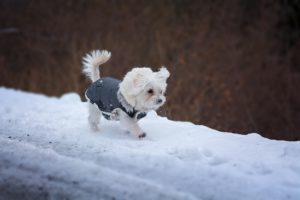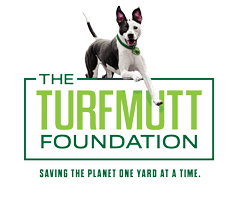Latest Posts
- Have a purpose when backyardingAugust 5 2021
- Study: Time outside alters our microbiomeAugust 4 2021
- Happy National Mutt Day from Mo-MoJuly 27 2021
- New home? Avoid these common mistakes in your yard.July 26 2021
- Infographic: Plan a backyard staycation this summerJuly 22 2021
Categories
Archive
January 16th
9 wise winter weather tips for your pet

Winter creates a whole new canvas in the living landscape, with snow blanketing our backyards, community parks and schoolyards. Dogs like Mutt Mulligan, the new TurfMutt Foundation spokesdog, enjoy sniffing, exploring and digging in the winter wonderland. But there are some simple steps pet owners need to take to ensure their pups are safe and healthy during the cold weather months.
“Even though they have fur coats, our pets are affected by snow and cold weather just like we are,” says Kris Kiser, Mulligan’s human and the President and CEO of the Outdoor Power Equipment Institute (OPEI) and the TurfMutt Foundation. “Being an ‘outsider’ by spending time in our living landscapes is good for people and pets, but we must do so safely when the temperatures drop.”
The TurfMutt Foundation, which encourages outdoor learning experiences and stewardship of our green spaces, offers these 9 tips for keeping our furry friends healthy and safe this winter.
Bring Outdoor Dogs Inside
The safest, most comfortable place for your pet during the winter months is inside with you. Remember, if it’s too cold for you, it’s also too cold for your pet. Offer a warm, dry place to rest inside. A pet bed works perfectly.
Know Your Fur Facts
With the exception of the fur in between their paw pads, which you should trim to prevent painful ice balls from forming, do not cut your dog’s fur in the wintertime. Pets naturally develop winter coats to protect them from the harsh elements. Also, remember that not all dogs are created equally well for winter conditions. Smaller dogs, those with shorter hair, older pups, and pets who are sick might need winter attire like a coat or protective booties to be comfortable outside. For very frail pups and young puppies who have a hard time regulating their body temperature, you will want to limit exposure to necessary breaks and very short walks.
Keep Them Clean & Dry
Keep a dry, clean towel near the door to wipe down your pet’s legs, belly and paws after each outdoor excursion. Also, check your dog’s ears, paws and tail for any sign of frostbite, which shows up as discolored skin, swelling or blisters. Signs of hypothermia include shivering, shallow breathing, weak pulse and lethargy. If either of these conditions appears, take your dog to a warm, dry place and contact your vet. Finally, ice-melt is helpful for humans, but it can hurt your furry friend by irritating their skin and can cause serious illness if ingested.
Wear Reflective Gear
Shorter winter days mean daily walks are often done after the sun sets. In addition to choosing a walking route that is lighted and keeping your dog close to you when walking on the street, you can offer extra protection by getting your pet a reflective collar, leash or coat. Reflective clothing is a good idea for the humans in your pack, as well. Lighted headgear not only helps drivers see you, it also makes it easier to clean up after your dog when you’re on a walk in the dark.
Be Careful Around Ice
Slipping on the ice accumulated on sidewalks and roads can cause muscle strains and other injuries. For those who live near a pond or lake, extra precautions need to be taken to keep your dog – and yourself – away from frozen bodies of water. Even if it looks solid, you or your pet could fall through thin ice.
Be Food & Water Wise
Winter air is dry, so make sure your pet has unlimited access to fresh, clean water to drink. Monitor their food and snack intake since indoor pets – like humans – will burn fewer calories during the winter months.
Operate Outdoor Power Equipment Safely
Using a snow thrower can make quick work of snow removal and create a path to your pet’s relief area. But always keep kids and pets inside, away from the equipment when it is in operation. Having a portable generator on hand can help your whole family stay safe and warm during a winter power outage. Use it safely by keeping the generator dry and placing it outside, away from windows, doors and vents.
Be Prepared for Emergencies
When you are preparing your family’s winter emergency kit, don’t forget the family pet. You should include enough food, water and medication to last five days.
When All Else Fails, Have Fun Inside
As much as Mutt Mulligan or your dog might love romping in the snow, there will simply be days when winter weather makes getting exercise outdoors impossible. Stave off boredom by teaching your dog a new trick or working on an obedience lesson inside. Treat toys and puzzle games provide both mental and physical stimulation until the weather improves.
To learn more about the benefits of your family lawn for pets and people during all seasons, go to TurfMutt.com.





